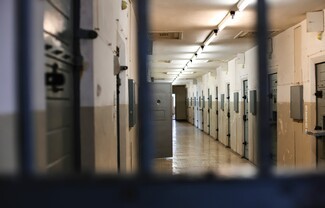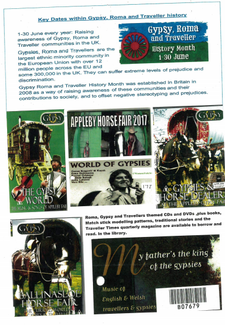We need to ensure that Gypsy and Traveller prisoners have equal access to rehabilitation'

The Traveller Movement is set to go into prisons and investigate and then tackle any barriers that may stop Gypsy and Traveller prisoners from accessing potentially life-changing rehabilitation programmes, such as education, well-being and employment classes.
Almost all rehabilitation programmes and prisoner group sessions (known in prisons as “purposeful activities”), such as GRT prisoner meetings and employment skills and trade workshops, ground to a halt during the Covid pandemic as prisons across the UK shut down any activities that could spread the virus. The Traveller Movement wants to make sure that as prisons open up and rehabilitation programmes kick in again, that Gypsy, Roma and Traveller prisoners will not be forgotten or overlooked by the prison authorities.
“We need to ensure that Gypsy and Traveller prisoners have equal access to purposeful activities in prisons and that they suit the needs of prisoners from those communities,” said Traveller Movement researcher Rebecca Thompson.
“We also need to find any barriers to engagement work out how prison staff and prisoners can work to overcome them, for instance, many Gypsy and Traveller prisoners may have had bad experiences of formal education when they were children and could be worried that those experiences will be repeated in prison education classes,” added Rebecca Thompson.
“Purposeful activities in prison are essential for prisoners’ health and well-being and help to cut re-offending rates. They include employment in the prison system, such as working in the library or the kitchens, which then give the prisoner a bit of income that they can spend on phoning relatives and also spend in the prison tuck shop on items such as deodorant. They also include therapy and counselling sessions and literacy skills and education, including trade skills such as woodworking.”
Rebecca Thompson adds that many purposeful activities also get prisoners out of their cells and mixing with other prisoners and with course providers, like teachers and therapists, all of which is essential to maintaining the prisoner’s mental health and well-being.
To start their investigation, The Traveller Movement is holding a meeting on April 13th at its offices in south London with Romany Gypsy and Irish Traveller people who have been in prison, but have now been released. Details of how to get involved are at the bottom of this article.
Following that meeting, Traveller Movement researchers will then be entering prisons across England in April and May to interview both prisoners in confidence and some prison staff to find out what is going on and how the access of Gypsy and Irish Traveller prisoners to “essential” rehabilitation and education programmes and employment opportunities (known by prison authorities under the umbrella term of “purposeful activities”) can be improved.
The research has been welcomed by the prison authorities themselves. Purposeful activity programmes are seen as an important part of cutting re-offending rates.
"We want to find out what those barriers preventing Gypsy and Traveller prisoners accessing purposeful activities are, and what can be practically done to remove them, ensuring that when they leave the prison system and enter the outside world, they have the same opportunities as other prisoners,” said Rebecca Thompson.
According to official government figures, Gypsy, Roma and Traveller people are over-represented in prions compared to the wider population and make up 5% of the prison population.
According to research by the Irish Chaplaincy, many Gypsy and Traveller prisoners enter the prison system unable to read or write, and with little or no employment skills and then often face discrimination and racism inside from prison staff and other prisoners.
“I’ve been told that I’m aggressive because I use my hands when I speak. I’ve been told I’m threatening because I’ve got a loud voice,” an Irish Traveller prisoner told the Irish Chaplaincy for its 2011 report on Irish Travellers in prison. “But if you came from a family of thirteen you’d be loud. It’s not aggression. It’s normal. It’s just how we talk.”
Another prisoner told the Chaplaincy that in his prison you have to fill in a form to get access to literacy classes – which may be ok if you have prisoner friends who can read and write and do it for you, but if all your friends can’t read or write either then you can’t learn to read and write.
Some forward looking prisons work with prisoners to run special Gypsy, Roma and Traveller prisoner groups and also mark Gypsy, Roma and Traveller History Month in June, but this kind of approach is patchy across the prison system and often relies on the good-will and capacity of individual prison staff members with the consent of individual Prison Governors.

The Travellers Times in prisons
The Travellers’ Times Magazine gets delivered free to many GRT prisoner groups and to individual GRT prisoners, and the editor receives many letters from the prisoners themselves.
One prisoner wrote to the prison newspaper Inside Time saying that he wanted to get copies of the Travellers’ Times Magazine sent to HMP Swaleside. He told Inside Times that he was a “lifer” and both Inside Time and National Prison Radio were a great help in getting him through his sentence.
“Another big help was reading the Travellers’ Times, a magazine for Gypsies and Travellers,” he added.
“Unfortunately, I have not seen it for a while and do not know how to get hold of it. I would love some information on how to get it here at HMP Swaleside and in prison generally.”
We now send 35 copies of the Travellers’ Times Magazine to the GRT prisoner group and library at Swaleside HMP.
Mike Doherty for TT News
(Lead photograph by Matthew Ansley on Unsplash)
FROM THE TRAVELLER MOVEMENT:
“We are looking for Gypsy or Irish Traveller people (men and women 18 or over) that have served time in a UK prison to talk to us in an hour-long group session at our office in south London on Wednesday 13th April. The aim is to help us explore how best to meet the education and work needs of Gypsy and Irish Travellers within the Criminal Justice System."
Please contact Rebecca at research2@travellermovement.org.uk to find out more. We will pay for your travel and time, and offer light lunch!